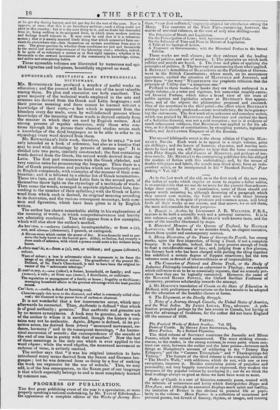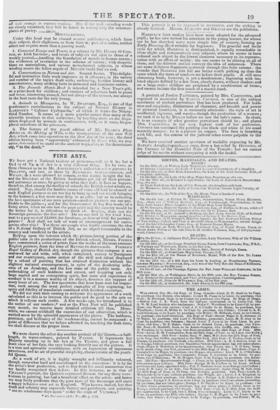PROGRESS OF PUBLICATION.
THE first great publishing event of the year is a speculation, or more properly speaking a national undertaking, by Mr. Tarr of Edinburgh— the appearance of a complete edition of the Works of Jeremy Ben- thorn, "tow first collected," expres,ly adapted fur circulation among the Many. Tile contents of the First Part—containing, however, the matter of °several volumes, at the cost of only nine shillings—are
The Principles of Morals and Legislation. On the Promulgation of Laws; with Specimens of a Penal Code.
On the Influence of Time and Place in Matters of Legislation.
A Table of thc Springs of Action. A Fragntent on Governments; with the Historical Preface to the Second Edition.
These works are well chosen ; for they embrace all the leading points of politics, and one of morals. 1. The principles on which both politics and morals are based. 2. The time and place of applying the principles of politics. 3. The best way of announcing them when applied. 4. BENTHAM'S demolition of BI.ACKSTONE on the Perfection of Govern- ment in the British Constitution ; whose merit, on its anonymous appearance, excited the attention of MANSFIELD and JOHNSON, and drew from " the wary" WEDDEBERNE the prophetic criticism that the principle of Utility was "a dangerous one." Prefixed to these books—for books they are though embraced in a single volume—is a terse and vigorous, but somewhat roughly-execu- ted General Preface, which takes a broad view of the state of public opinion and legislative science at BENTHAM'S first appear. once, and of the objects the philosopher proposed and executed. One of the assertions in the third point—the effect which BENTHAM'S writings have already produced—seems contradictory, the facts gainsay- ing the statements. The first work of an unknown and nameless writer, which was praised by MANSFIELD awl JOHNSON and excited the fears of a Solicitor- General, was not a cold reception ; nor is it evidence of much subsequent coldness, that BENTHAM was applied to for his ad. vice, or for draughts of constitutions, by struggling patriots, legislative bodies, and ALEXANDER Emperor of all the Hussies.
The second bibliopolic event is the cheap edition of Captain MAR. amyl's Novels. Each work is to appear in a single volume, price six shillings ; and the lovers of humour, character, and moving acci- dents by land and sea, will rejoice to hear that the issue commences with Peter Simple, the chrf-d'auvre of MARRYAT, and perhaps of mo- dern novels. Mr. BENTLEY is the enterprising publisher who has obliged the readers of fiction with this undertaking ; and, by the means of double titicpages and labels, the novels may stand alone, form an inde- pendent series, or be incorporated in his " Standard Novels," Peter making " Fel. 62."
As in the last week of the old, so in the first week of the new year, the influx of works which require or seem to require a fuller notice, is so considerable that we can do no more for the present than acknow- ledge their receipt. If, on examination, some of them should not appear worth recurring to, although deserving of a paragraph which they cannot now receive, the fault must rest with those literary aceoucheurs who, in despite of prudence and common sense, will bring forth all their works at one season, and that season, let us tell them, the most unfavourable for their purposes.
1. Travels in Arabia, by Lieutenant J. It. W EusTrip, F.R.S., appears to be both a scientific work and a personal narrative. It is in two volumes—got up with Mr. MURRAY'S well-known taste, and the route of the traveller illustrated by maps.
2. Historical Memoirs of the Queens of England, by HANNAH LAWRENCE, will be found, or we mistake much, an elegant narrative, drawn from quaint and contemporary sources.
3. Diary Illustrative of the Times of George the Fourth, has strong marks, upon the first inspection, of being a fraud, if not a complete forgery. It is probable, indeed, that it may possess enough of truth to float a considerable mass of lies ; and, judging from a few glances, the literary back who has been charged with putting the thing together has exhibited a certain degree of flippant smartness; but the two volumes seem as devoid of trustworthiness as of respectability.
4. The Connexion of Natural and Divine Truth, or the Study of Inductive Philosophy considered as subservient to Theology; two subjects which still seem to us to be so essentially separate, that we scarcely per- ceive how they can be logically connected. However, the name of the Reverend BADEN POWELL, the Oxford Savilian Professor of Geometry, promises scholarship towards the attempt.
5. Mr.HORNER'S translation of Cousin on the State of Education in Holland, with preliminary observations on the best means to be adopted for the education of the humbler classes at home.
6. The Elopement, or the Deadly Struggle.
7. Notes of a Journey through Canada, the United States of America, and the West Indies. By JAMES LOGAN, Esq., advocate. A pub- lication prompted perhaps by the late events in Canada, but having at least the advantage of freshness, for the author did not leave England till the summer of 1836.
POETRY.
The Poetical Works of Robert Southey. Vol. III. Pedro of Castile. By HENRY JouN SHEPHERD, Esq. Hera Poetics. By a Retired Physician.
The third volume of SOUTHEY continues the Juvenile and Minor Poems, which the second commenced. The most striking circum- stance, to the reader, is the strong contrast, in every point where con- trast can exist, between the earlier and the later poems—between such things as Humphrey's account of soldiering in the " Botany Bay Eclogues," and the " Carmen Triumphale" and " Thanksgivings for Victory." The feature of the third volume is the complete edition of " The Devil's Walk," with additions, which do not, with one or two exceptions, improve it. Besides containing points of prejudice and personality, riot very happily conceived or expressed, they weaken the terseness of the popular version by overlaying it ; nor do we think the final readings always so good as those we have been wont to meet.
Pedro of Castile is a sort of historico-romantic poem, treated with the mixture of seriousness and levity which distinguishes Beppo and Don Juan ; and although its execution displays much spirit and facility, the imitation of BYRON is too obvious to promise life or popu- larity to the volume. Herm Poetica is a collection of occasional and personal poems, not devoid of fluency, rhythm, or images, and running off well enough in cursory reading. But if the NVtli..,witiding words are closely examined, they will be found to convey only the common- places of poetry.
MiscELLarsrons.
Under this head may be classed several publications, which from their subject, their slightness, or from form'n part of a series, neither admit nor require more than a passing wore.
1. Connected Essays and Tracts, is a volume by Mr. HENRY O'CoN. won, an Irish barrister ; and treats of subjects not akin to those of a weekly journal,—handling the foundation of morals in human nature ; the evidences of revelation in the scheme of nature ; with disquisi. Lions on materialism, and various metaphysical subjects, in whose winding mazes the fallen angels of MILTON could find no end.
2. Conversations on Nature and Art. Second Series. This delight- ful and instructive little work improves as it advances, in the variety and number of the topics dealt with; embracing, besides history and manufactures, many striking facts in animated and inanimate nature.
3. The Juvenile Shetch-Book is intended for a New Year's gift, or a prize-book for children; and consists of selections both in prose and verse, interesting enough, but not always of the newest, nor always in the best taste for the very young.
4. Animals in Menageries, by W. SWAINSON, Esq., is one of that gentleman's contributions to the subject of Natural History in LARDNER'S " Cabinet Cyclopedia," of which it forms the Ninety- third Number, It seems of a more popular nature than many of the scientific treatises in that collection ; by touching more on the dispo• sition displayed by animals in confinement, with, as it were, biogra- phical anecdotes of the prisoners.
5. The feature of the fourth edition of Mr. /3aAny's Plain Advice on the Making of Wills, is the incorporation of the new Will Act, which came into operation on the first day of the year ; the third edition having- been 4. opportunely" exhausted by tls.s.e who, we may opine, determined to stand on the ancient ways, c',11, as the rhetoricians " to the death."
































 Previous page
Previous page